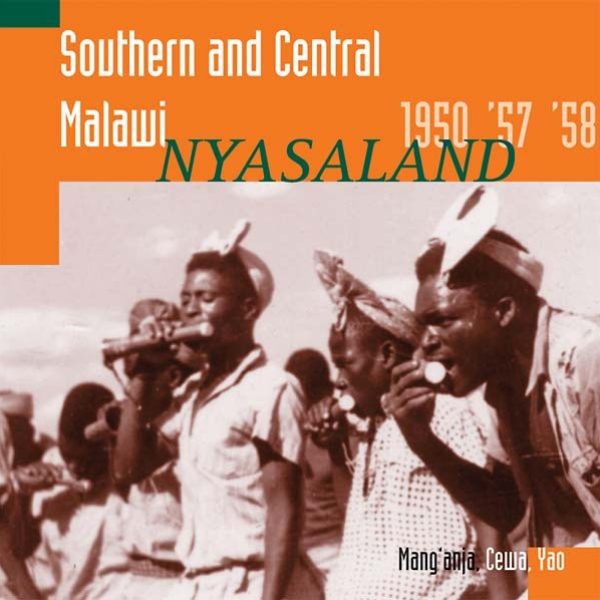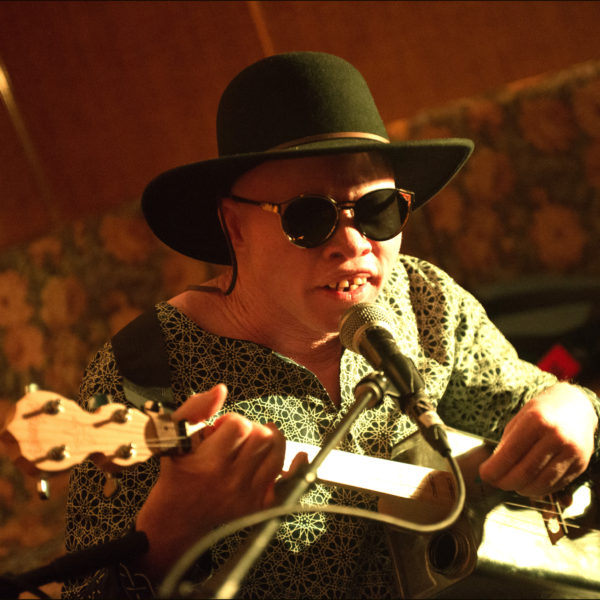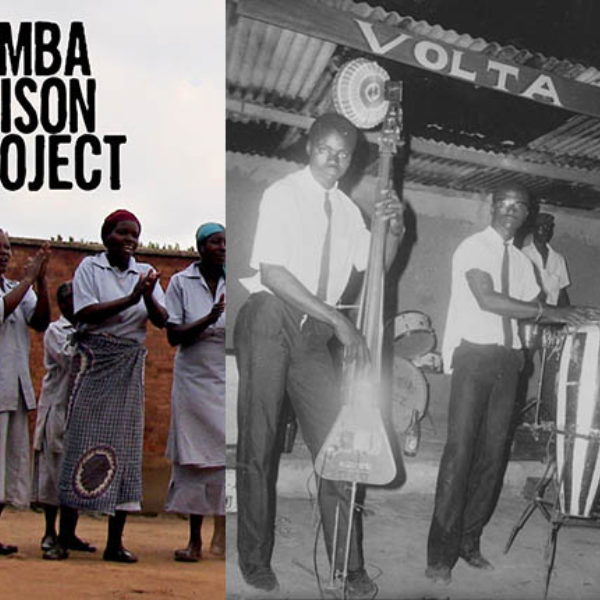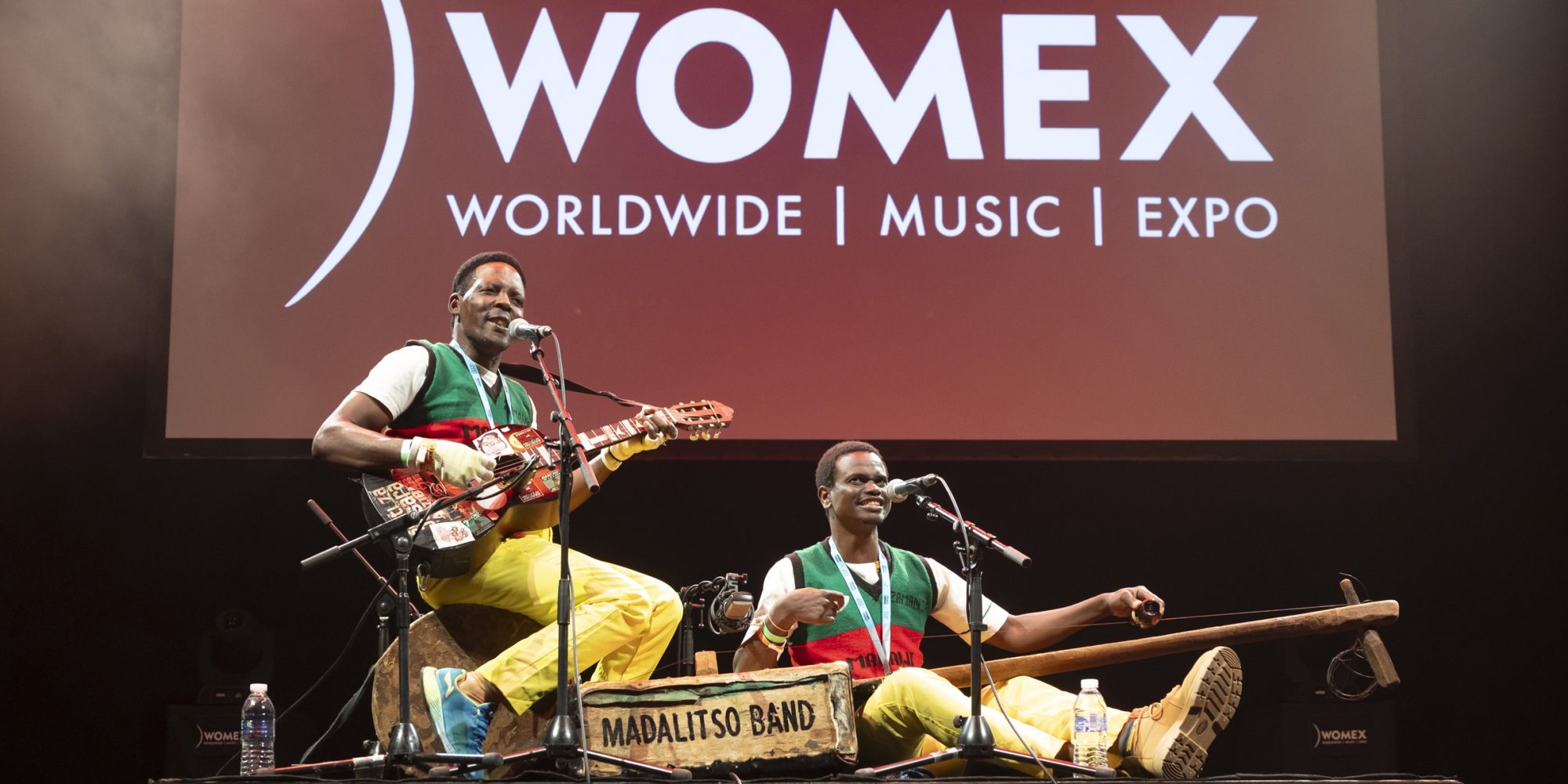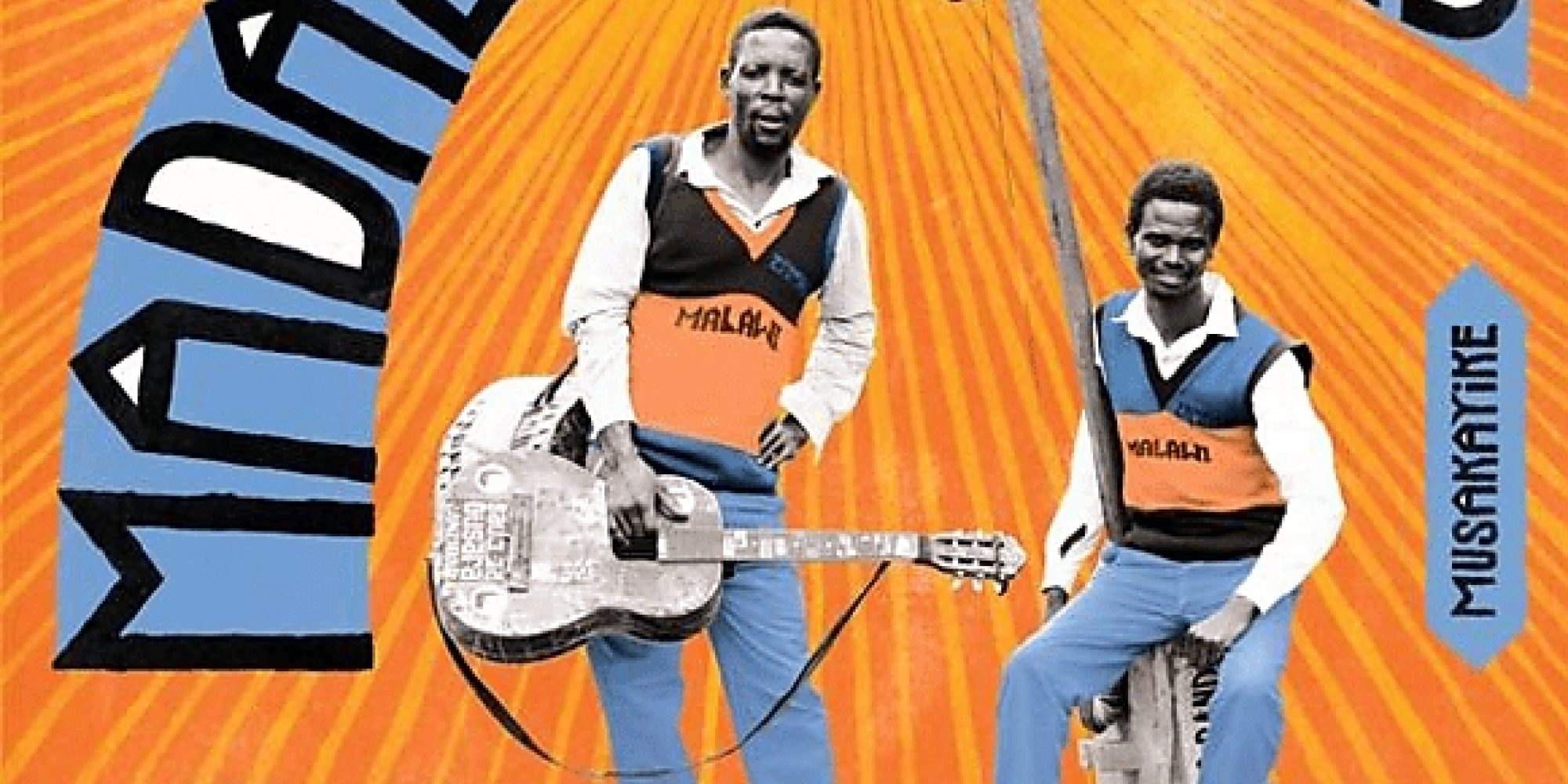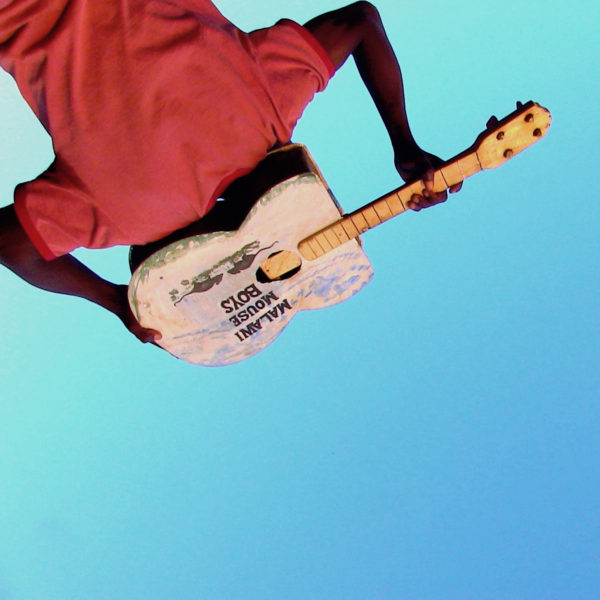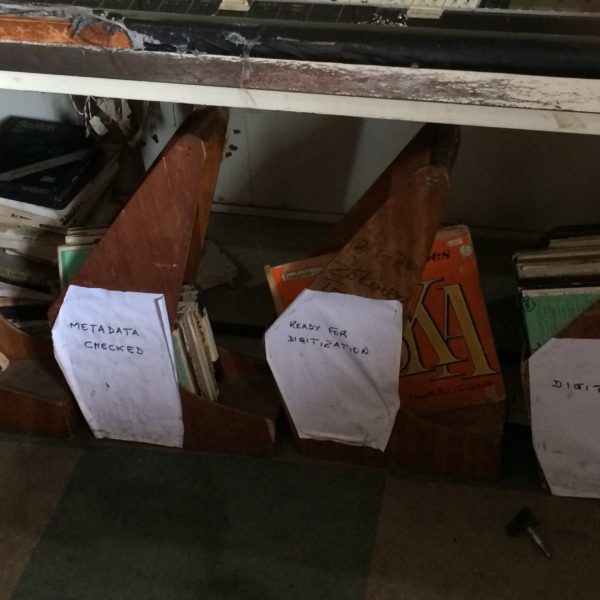Banner image by Jacob Crawfurd
Back in 2002, 18 year-old Yobu Maligwa was walking down the street in the capital city of Lilongwe in Malawi, the small land-locked country bordering Zambia, Tanzania and Mozambique. Coming towards him was another teenager of the same age, Yosefe Kalekeni, who was strumming on a four-string homemade banjo (in Malawi, a “guitar” refers to an electric guitar, while an acoustic guitar is called a “banjo”), which he was still learning to play. Yobu stopped him and told him that he too wanted to be a musician and maybe they should start a band. And so they did. And then 22 years later, we watched them perform a showcase at WOMEX in Manchester, England. The band previously played the “virtual” WOMEX in 2020 during the pandemic, but this time, we were able to see them live in person.
On stage, Yosefe plays an updated model of his original homemade banjo, which he built around the body of a used acoustic guitar he was given and augmented it, but its strings, as is tradition in Malawi, are unraveled motorcycle brake cables. While strumming, he sits on a drum, which he beats with his feet. Yobu plays his babatone, another homemade traditional instrument. His is a one-string instrument, which basically serves as a bass guitar, and looks like a guitar built for the Jolly Green Giant. Yobu sits on the floor and plays it with a slide. It is not so different of a set-up than when they first started, playing the streets and malls of the city. Their music, original songs based on a mash-up of their two tribes' traditional music, are often songs about love, songs praising god, or everyday fables that deliver life advice. But it's not music to sit back and watch, it's infectious, and got into the audience and onto their feet.
We took an opportunity after their set to have a brief chat with the duo, along with their co-manager Neil Nayar, who interpreted for us. The interview has been edited for both clarity and length.
Ron Deutsch: You guys spent 15 years just busking on the streets of Lilongwe, what was that like?
Yobu Maligwa: It was a different time, more difficult and very different from now. It was quite tough, like walking all day from morning until night with our instruments around the streets of Lilongwe, trying to find places to play. We were always moving, stopping if somebody asked us for a song to play at 50 cents a song. Sometimes even in a whole day, somebody might not even ask us to play a song, So it was a whole day of just walking around. And you meet crazy things on the streets – things like getting wet by rain, but even people try to rob us sometimes, because we're playing music on the streets and they would think we've got money in our pockets.
Yosefe Kalekeni: People would insult us. They would say we were mad and should go back to our villages and do farming.
And this was just around Lilongwe? What is the city like?
Neil Nayar: It's not your typical African city. You have to remember that 95% of Malawi has no electricity. Sometimes people refer to Lilongwe as a “city village.” There are no tall buildings, not even a city center to speak of beyond a financial and commercial district. There are basically three kinds of areas – high-density, which is like a ghetto for the poor, a medium-density area, and the low-density area where the rich people live. It's a very spread out city. It's huge compared to the population. But also people farm in the city. It's very green. People in their gardens are growing maize. Neither Yosefe nor Yobu were born in there, but moved there from their respective villages in their teens.
And were you able to make enough money playing on the street to get by?
Yobu: The majority of the income came from music, because the house we lived in was very cheap, like one dollar a month, very cheap housing. But sometimes we did have other jobs to supplement income.
Yosefe: I used to mold bricks sometimes, which is one of the kind of day laboring job that would be easy to get for one day.
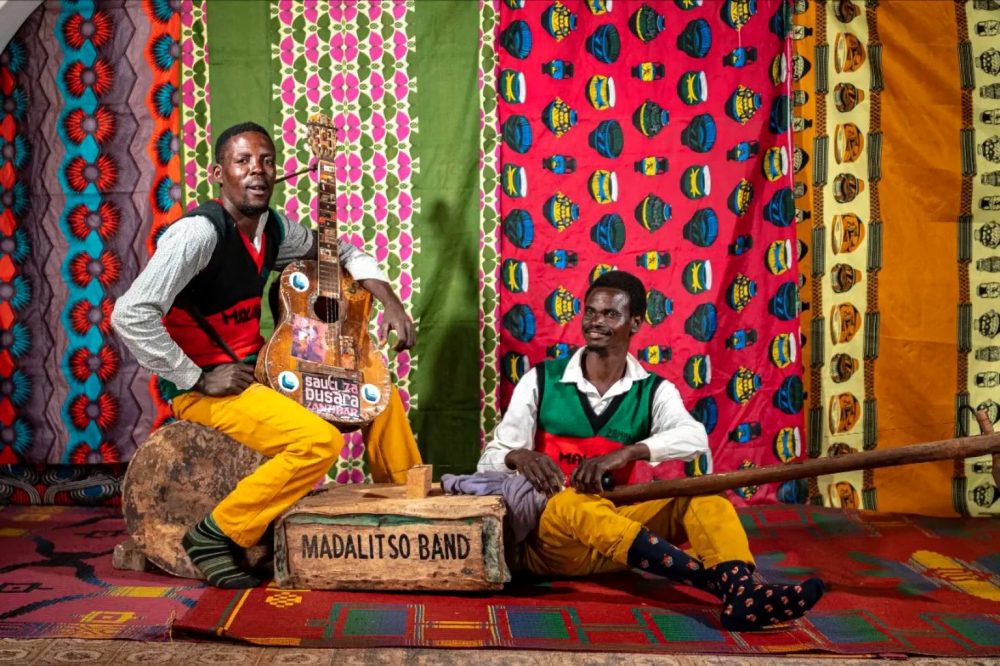
Tell me about the name “Madilitso.” What does that mean?
Yobu: We used to have a different name, but then as we started to play more and better, a woman came and told us we should take this name which means “blessings.”
And then in 2009, you met up producer Emmanuel Kamwenje (who continues to be the band’s co-manager with Neil) who saw you playing in the streets and invited you to record an album. Did you have any expectations that such a thing would happen? And did you believe him? Some guy shows up and says he wants to record you. What did you think?
Yobu: The same day that we met we went to the studio. We knew his name, and knew who he was. We went in with a certain amount of belief and faith that something would change, but actually when we recorded the album, nothing changed.
You know, when we write the songs, we would write the songs together, and it was always with a vision that the song will go somewhere, you know, that it will travel and reach people. So we had that idea with the album that the songs would really reach people.
But then the big break happened in 2017 when you had the opportunity to play at the Sauti Za Busara festival in Zanzibar. How did that come about?
Neil: So a bit of my back story.... I came to Malawi in 2012. I was playing back in England, and some guy who was living in Malawi said he thought my music would fit in Malawi for some reason – and he gave me a card for this there music school there called Music Crossroads. And I was at a music crossroads in my life, so it seemed like a sign so I went with it. And I went there with a one-way ticket and a guitar and no money on a little adventure. I started running open mic nights in Lilongwe looking for local talent. So they were one of the bands I'd found to come. And then I used to apply for Sauti Za Busara festival for my band and for other bands from the open mic night. So I applied for them along with these other bands and I was surprised actually that they got accepted.
Yosefe: We were scared at first because we had never been outside of Malawi.
What was it like to look out at the audience and see all these people?
Yobu: We were very happy. We saw everybody dancing. We did two shows.
Neil: It's a very important festival and there are many promoters and agents there. And when they were playing this guy turned and asked me: “How would you travel to Europe with the babatone?” That was the question. And I was like, “Um, we came on a bus.” Like even thought that we would travel like to Europe didn't cross our minds. And he's like, “But what about Europe?” And I'm like “We're not gonna go to Europe.” And he was like “But you could.” And then that's when we started the conversation and they connected us to Bongo Joe Records, and that's really the beginning of the whole story.
So what is it like to take the babatone on a plane?
Yobu: Big problem. Big problem. Airport. Airport. Every airport. Every time we have to check it in. Checking in, “What is this thing? No, I don't think that you can take that.”
Neil: Every time I have to be very calm. I tell them it is an instrument and that we travel up to 300 shows around the world and it's okay. And then the thing they worry about is if they break it, and we explain that this cost us 50 pounds to make [about US$60]. It's very strong, and it's traveled on lots and lots of flights.... and if you don't let us go on the flight we're going to be losing thousands of Euros.
There's no way to make one that breaks down into a couple of pieces?
Yobu: We will try. We're going to try. Yeah.
Neil: There's no way to really make one that just sort of, you know, comes apart. The problem is like the neck, that piece of wood, it's a very hard wood because the tension on that wire, it's really, really high tension.
And do you go somewhere to make the babatone? Like is there somebody who's a professional and makes them? Or is it something they make themselves?
Yobu: Make it yourself. There's not a teaching of how to do it, it's much more like okay, we want to make this sound, like how are we going to make our babatone.
Neil: They can come in different shapes and sizes. Some have one string, like Yobu's, others may have four or more strings.
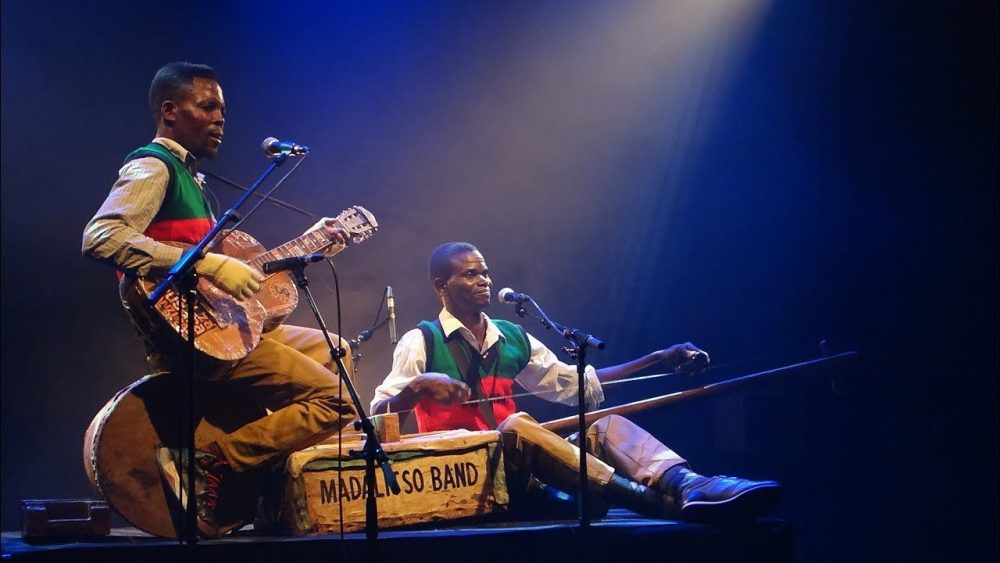
And you're still relatively unknown in Malawi though I understand?
Neil: Yes, but they are getting more known now. People see that they have now built their own houses and are curious about what they are doing.
And you have a new album coming out?
Neil: Yes. We've been recording it and are now mixing it. It should be out my June of next year. We've also been working on a documentary film about the band. It's going to be called The Banjo Boys and we're just finishing the edit on that, as well.
Thank you and good luck with it all.
Related Audio Programs
